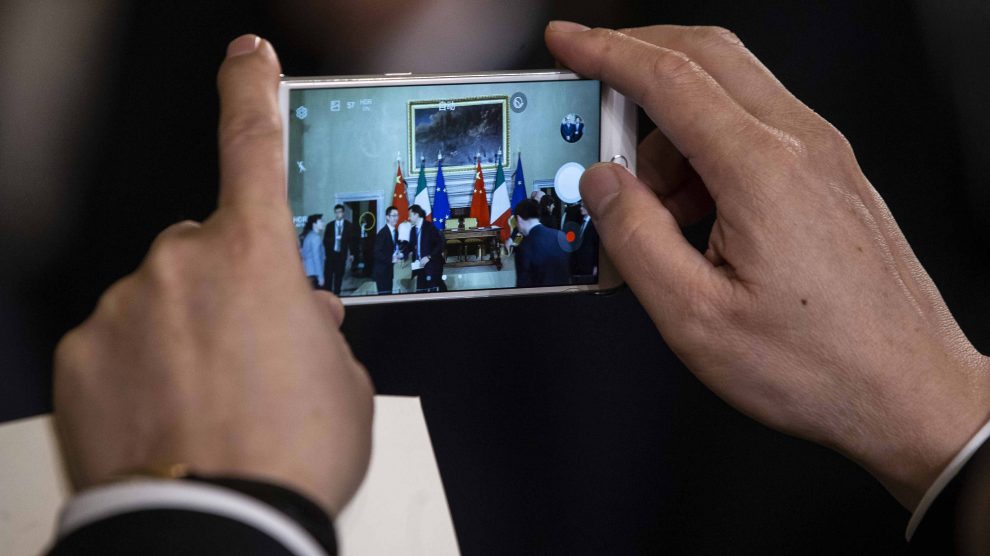About a week ago, Italy’s main newswire Ansa reported the release of the World Openness Index according to China (namely the Institute of World Economics and Politics under the Chinese Academy of Social Sciences and the Hongqiao International Economic Forum Research Centre).
Ansa’s piece simply relaunched the heavily biased rating of the openness of world economies, according to which Hong Kong and Singapore are among the top ten and the United States are in decline 2008. Except no Italian journalist penned this article, which came straight from Xinhua, China’s State-controlled newswire.
This is not a one-off occurrence. A recent report by the Institute of International Affairs (IAI) turned the spotlight on the Chinese liaison with the Italian media. A well-established phenomenon according to its authors, Francesca Ghiretti and Lorenzo Mariani, concerning all the largest Italian media groups – including the Italian Journalistic Agency (Agi), Adnkronos, Class Editori, Il Sole 24 Ore, Il Giornale, Mediaset, Rai (the public broadcaster) and Ansa.
The agreements were consolidated by the March 2019 signing of a Memorandum of Understanding, causing Italy to enter the Belt and Road Initiative (BRI). That document also spoke of the press.
Back then, two of the most important Italian public media outlets, Ansa and Rai, renewed their respective bilateral agreements with China Media Group (CMG) and Xinhua, both owned by the Chinese government.
Their objective was to relaunch each other’s contents and offer their translation to the public in the respective countries. An automatic exchange, sometimes limited to the simple translation of newswire releases. This, as IAI explains today, led to some misunderstandings.
“Chinese outlets tend to provide pre-translated articles that most of the time are published by the foreign counterparts without the necessary fact-checking or content control.” Consequently, the Chinese Communist Party (CCP) propaganda is also echoed in the Italian public media, without any revision.
This happens even on sensitive topics, such as human rights in Xinjiang or Hong Kong, which are conveyed through Beijing’s lenses. In the absence of either own information or journalist[s] with specific expertise, some news outlets end up re-proposing news taken from press agencies uncritically, thereby contributing to spreading propaganda,” reads the report.
With a note: the relationship between the Italian and Chinese media is not an equal relationship. “The stream of news is generally one-sided since Chinese media do not republish articles from their Italian counterparts,” write Ms Ghiretti and Mr Mariani.
The “Chinese connection” of the Italian media landscape had already attracted criticism from international observers in the past. A year ago, American technology expert Lindsay Gorman – who is currently in the Biden administration – called the Ansa-Xinhua partnership “a megaphone to influence Italian coverage on China.”
Also, Italian media outlets spreading unfettered Chinese content and receiving large public contributions effectively entails the Italian government financing the propaganda of a foreign State, albeit indirectly.
As the report explains, the cooperation of Chinese media with foreign newspapers is a tried and tested practice. Reports published by independent organisations have shed light on recurring tactics used by Chinese government-affiliated or related entities to influence foreign media, journalist organizations and freelance reporters.
These tactics include training programs for foreign journalists; fully paid exchange or travel programs in China; organisation of international events promoting the Chinese concept of journalism; acquisition of foreign media; cooperation programs with media outlets or journalist organizations.”
The mission, however, is always the same: promoting a good image of Beijing’s government abroad. Sometimes it works, sometimes it doesn’t. In Italy, as the IAI report reveals, the results are far from brilliant.
“According to one of the most recent studies on Italian public opinion about China, since 2017 the perception of 44.7 per cent of Italians towards China has remained unchanged, 38.5 per cent consider it has worsened and only 16.8 per cent see an improvement.”




